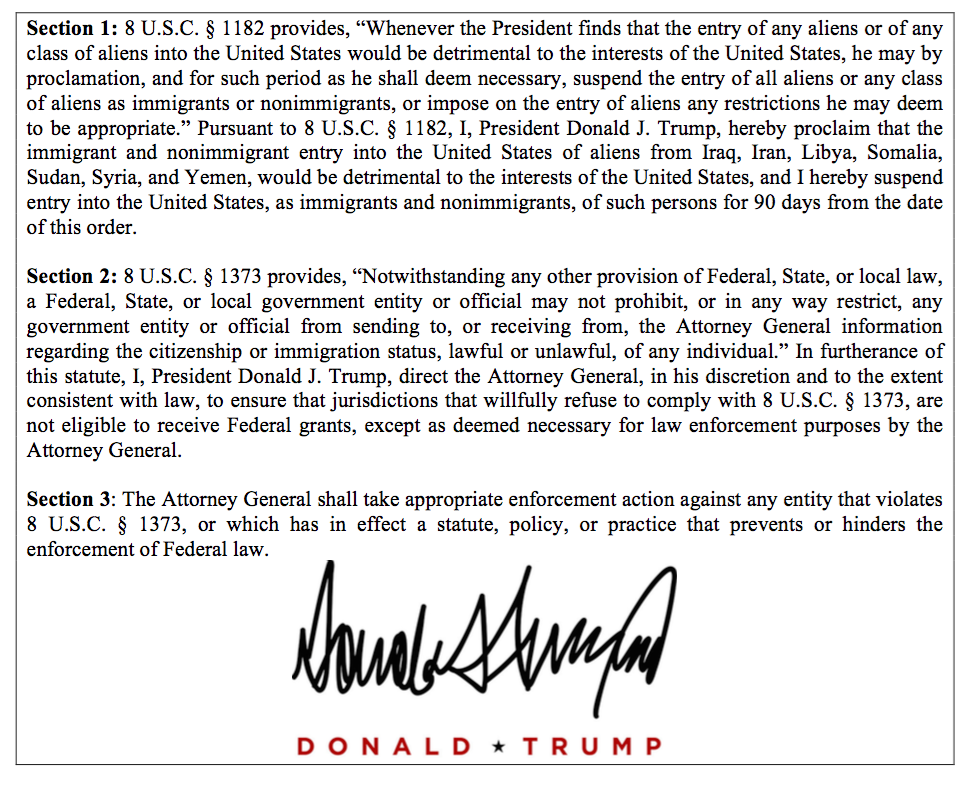My constitutional law midterm was borrowed, nearly verbatim, from President Trump’s first executive order. We have not yet covered the Establishment Clause or Due Process, so the facts were tweaked to focus on the federalism issue. You can read the exam and A+ answer here. Enjoy.
Instructions:
The time is now. Shortly after President Trump’s inauguration, he issued an executive order concerning immigration, which gave rise to several legal disputes between the state of Washington and the federal government. You are a law clerk for Judge Robarts, who sits on the United States District Court for the Western District of Washington, in Seattle. He has asked you to prepare a memorandum of no more than 1,000 words addressing five issues affecting this case. In preparing this memo, please keep separate your personal feelings about the order from your analysis about these legal issues.

In response, Washington enacts the Immigration Resistance Act of 2017, which has two sections:
Section 1: A state official that provides the federal government with information concerning any immigrant in the state shall be guilty of a misdemeanor, and be liable for a fine of at least $1,000.
Section 2: A federal official that requests information from a state official concerning an immigrant in the state shall be guilty of a misdemeanor, and be liable for a fine of at least $1,000.
The Attorney General sent a letter to the Governor of Washington, stating that pursuant to 8 U.S.C. § 1373, the state’s decision not to share information about aliens in custody “would result in a loss” of $1 billion in grants, annually. Washington currently receives a total of $10 billion in federal grants each year, and the state’s total budget is $100 billion per year.
Several lawsuits are filed, all of which were consolidated in Judge Robarts’ court. He has asked you to prepare a memorandum of no more than 1,000 words addressing five issues affecting this case.
- Washington filed suit against the Attorney General, claiming that the decision to withhold $1 billion in funding violates the principles of federalism. Assess the constitutionality of the notice to withhold $1 billion in funding.
- The Attorney General challenged the constitutionality of Section 1 of the Immigration Resistance Act, asserting that it conflicts with 8 U.S.C. § 1373. Assess the constitutionality of Section 1 of the Immigration Resistance Act.
- The Attorney General challenged the constitutionality of Section 2 of the Immigration Resistance Act, asserting that it conflicts with 8 U.S.C. § 1373. Assess the constitutionality of Section 2 of the Immigration Resistance Act.
- Washington filed suit against President Trump, and other administration officials, asserting that Section 2 of the Executive Order was illegal. [Washington did not bring suit under the Free Exercise Clause, the Establishment Clause, the Due Process Clause, or the Equal Protection Clause]. The complaint asserts that Section 2 of the executive order violates 8 U.S.C. § 1152, which provides that “no person shall receive any preference or priority or be discriminated against in the issuance of an immigrant visa because of the person’s race, sex, nationality, place of birth, or place of residence.” President Trump defended his action, stating that § 1182 allows him to “suspend the entry of all aliens or any class of aliens as immigrants” that he finds “detrimental to the interests of the United States,” and he has the ultimate constitutional duty to keep the nation safe. Judge Robarts tells you that he is uncertain how to reconcile the conflict between § 1152 and § 1182. He asks you to address how Justice Jackson’s concurring opinion in Youngstown Sheet & Tube Co. v. Sawyer should inform this question of statutory interpretation.
- After the case is argued, but before it is decided, President Trump tweets about Judge Robarts: “The opinion of this so-called judge, which essentially takes law-enforcement away from our country, is ridiculous and will be overturned!” Judge Robarts asks you to assess whether he should, or should not, address the President’s tweet in his opinion. Please give specific reasons, with reference to the Supreme Court’s history, to support your recommendation.